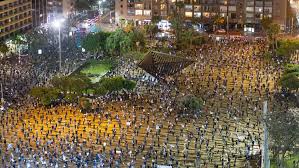By Seth Gellman
On April 19th, Israelis protested what they saw as a corrupt government using drastic measures to contain the coronavirus. After Benny Gantz, former leader of the centrist Blue and White party, joined Benjamin Netanyahu to form a unity government, leader of the right-wing Likud party, protestors accused Gantz and Netanyahu of destroying democracy in Israel.
Gantz joined Netanyahu to form an emergency government to fight the coronavirus, after three rounds of elections gave neither a majority in the Knesset. Three elections have been held in Israel since April 2019, with an election in March being the most recent.
Netanyahu is a controversial figure in Israel despite being the longest serving prime minister. He was formally indicted on charges of bribery and fraud in three separate cases in January. Netanyahu denies all charges. In all three elections, Gantz ran a campaign highlighting the need to replace Netanyahu at all costs. He then signed a deal with Netanyahu earlier in April stating that Netanyahu will be prime minister for 18 months and then Gantz will become prime minister. Another faction of the Blue and White party, led by Yair Lapid, split from the party recently because of Gantz’s handing of a parliamentary speaker nomination, where Gantz proposed himself to be speaker to gain more time to negotiate with Netanyahu. This further complicates the situation but Netanyahu and Gantz still have a majority in the 120 member Knesset.
Lapid led the protests against the unity government, calling measures like tracking phones to prevent the coronavirus to be excessive. Lapid also claims that Netanyahu has “turned the word democracy into a leftist word.” Other concerns were that Netanyahu has demanded the power to appoint police chief, state prosecutor, and attorneys general as part of the negotiations. He does not have the power to do so since being indicted and it might compromise the integrity of his trial. Social Distancing was enforced during the protests by the police.
Israel’s past year has been tumultuous but indicative of change. There has not been a new prime minister since Netanyahu took office in 2009. He was also prime minister from 1996 to 1999. Israel appears to be leaving the Netanyahu era and transitioning into a new era of vast change.

